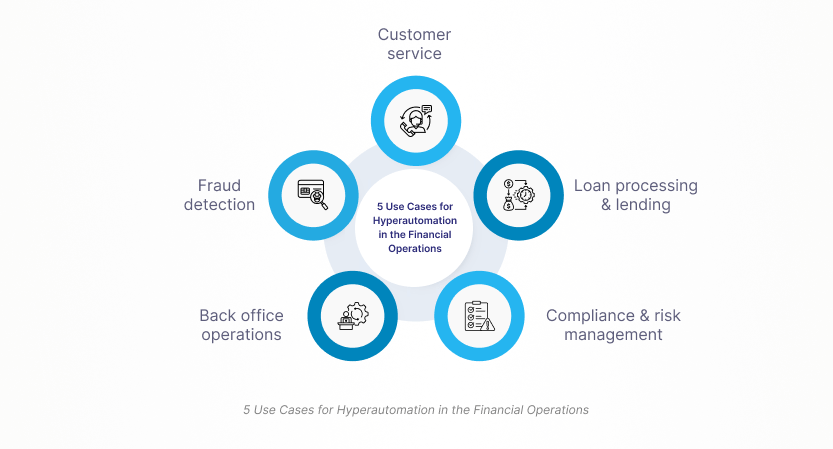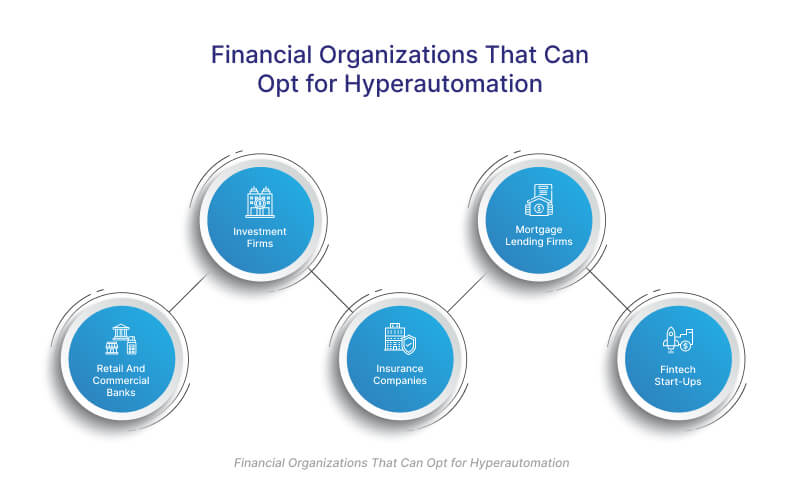5 Use Cases of Hyperautomation in Financial Operations for Smarter and Data-Driven Processes
Introduction
From data entry, management, and manipulation to decision-making, task execution, and handling diverse processes, financial organizations encompass a wide range of crucial tasks. Performing each of them manually in a conventional manner creates gaps and bottlenecks in the system, causing inefficiencies. The tasks are simplified with the adoption of digitalization, including online payment systems, AI-driven software, and modern techniques. But the gaps in organizational performance are still not filled, and the errors and delays persist.
This need for a more efficient work process is addressed comprehensively by hyperautomation. It is an advanced process of automating the entire business process, leveraging robotic process automation as its foundation. In any case, the market’s growth advocates for its benefits. By 2033, the worldwide hyperautomation market size is projected to reach USD 198.96 billion. Banks and other financial institutions, with the assistance of RPA services, can integrate hyperautomation into their systems. To shed light on the significance of hyperautomation, this blog explores the use cases of hyperautomation in financial operations.
What is Hyperautomation and Its Implications for the Financial Sector
Hyperautomation is a strategic system that combines advanced technologies and platforms like Robotic Process Automation (RPA), Machine Learning (ML), Artificial Intelligence (AI), Business Process Management (BPM), Process Mining, and Integration Platform as a Service (iPaaS). By utilizing best-in-class cognitive abilities, exception handling, and adaptive learning, the hyperautomation solution automates business processes efficiently. As a scalable and flexible system, it enables financial organizations to tailor automation capabilities to meet their specific needs.
In this digital world, customers seek fast and reliable online systems, as well as a more personalized experience in banking and other financial services. The integration of hyperautomation accelerates and optimizes financial operations, improving the customer experience. Thus, empowered by the hyperautomation solution, banks, insurance companies, and other financial organizations can ensure innovation and growth, competing effectively against the emerging fintech market.
5 Use Cases for Hyperautomation in the Financial Operations
For banks and other financial institutions, traditional financial operations can no longer be enough to stay relevant and reliable in today’s competitive financial business environment. Using advanced technology, including hyperautomation, is helpful in this context. Anyway, here are the five common use cases for financial institutions where the potential of hyperautomation is leveraged to introduce smart, data-driven work processes.

Fraud detection:
By utilizing a machine learning algorithm in a modern and innovative approach, the hyperautomation solution can help to identify and mitigate fraud in financial operations. It detects suspicious transactions and user behavior patterns by analyzing a large dataset, thereby protecting organizations from potential fraud threats.
Customer service:
Gaining and retaining customer trust plays a pivotal role in the growth of a financial company. With a hyperautomation solution, customer queries can be answered promptly, and customers can submit their feedback and documents for necessary financial tasks effortlessly. Thus, customer service can be seamless with a hyperautomated system.
Loan processing & lending:
Whether it is loan processing in a bank or a mortgage lending company’s lending procedure, both are time-consuming and labour-intensive. The journey from loan application to approval is tiresome and sometimes complicated as well. Using hyperautomation technology, impediments such as employment verification and credit score checks can be overcome efficiently.
Compliance & risk management:
On one hand, by automating compliance checks and monitoring industry regulations, hyperautomation solutions can help financial organizations meet industry standards strictly. On the other hand, they automate the analysis and management of portfolio, credit, and market risks, ensuring a hassle-free growth journey for the organizations.
Back office operations:
The increasing back-office responsibilities in any financial institution can be streamlined efficiently with the help of hyperautomation. The steady speed at work like audits, internal reporting, documentation, etc., provided by traditional automation processes can be accelerated with the hyperautomation technology.
Banks and other financial institutions can overcome the ongoing automation challenges and enhance the scope of automation by utilizing hyperautomation based on robotic process automation. Moreover, new automation strategies can be rethought to ensure greater efficiency and save costs. Thus, a new dimension of digitalization is unveiled ensuring business continuity and sustainable brand reputation for financial brands in the KSA.
Financial Organizations That Can Opt for Hyperautomation
From retail and e-commerce to healthcare, travel, and hospitality, numerous industries utilize the capabilities of AI chatbots in diverse ways to enhance their customer experiences.

- Retail and commercial banks: Hyperautomation enables banks, both retail and commercial, to enhance fraud monitoring, KYC updates, loan approvals, and advanced chatbot customer support.
- Investment firms: By using hyperautomation, investment firms can efficiently gain portfolio insig hts, conduct accurate reporting, and ensure regulatory compliance.
- Insurance companies: The steps of claims processing and underwriting can be performed effortlessly with hyoerautomation. Also, AI-based OCR is used to streamline the documentation process.
- Mortgage lending firms: The loan processing becomes easy and swift with hyperautomation solutions, as document verification, credit assessment, and underwriting are automated.
- Fintech start-ups: From real-time analytics and onboarding to customer engagement and anti-money laundering (AML) compliance, hyperautomation streamlines everything.
SquareOne: Your Trusted Partner for Hyperautomation Solution Powered by RPA Services
Understanding the unique needs of every financial institution, SquareOne provides comprehensive hyperautomation solutions based on advanced robotic process automation services. As a leading digital solutions partner, SquareOne aims to transform the digital infrastructures of banks, lending firms, and other financial institutions by driving efficiency and accuracy into their work processes. Our strategic approach, combined with advanced technologies, enables financial organizations to thrive in the modern and dynamic business environment while adapting to evolving regulatory systems and shifting customer preferences.
Final Words
To develop more scalable and intelligent automation solutions in your financial institution, embracing hyperautomation is crucial. It makes your existing automation solutions both robust and user-friendly. By combining multiple technologies, it not only reduces manual workloads but also optimizes financial operations. Using hyperautomation technology powered by robotic process automation services, financial institutions can increase innovation and work efficiency. In this way, with the strategic adoption of hyperautomation solutions, employee productivity can be enhanced and customer satisfaction can be achieved. However, to automate complex business tasks and decision-making efficiently, ensure seamless integration of hyperautomation solutions into your existing organizational systems.
Intend to learn more about SquareOne’s hyperautomation solutions? Check it out here.

















